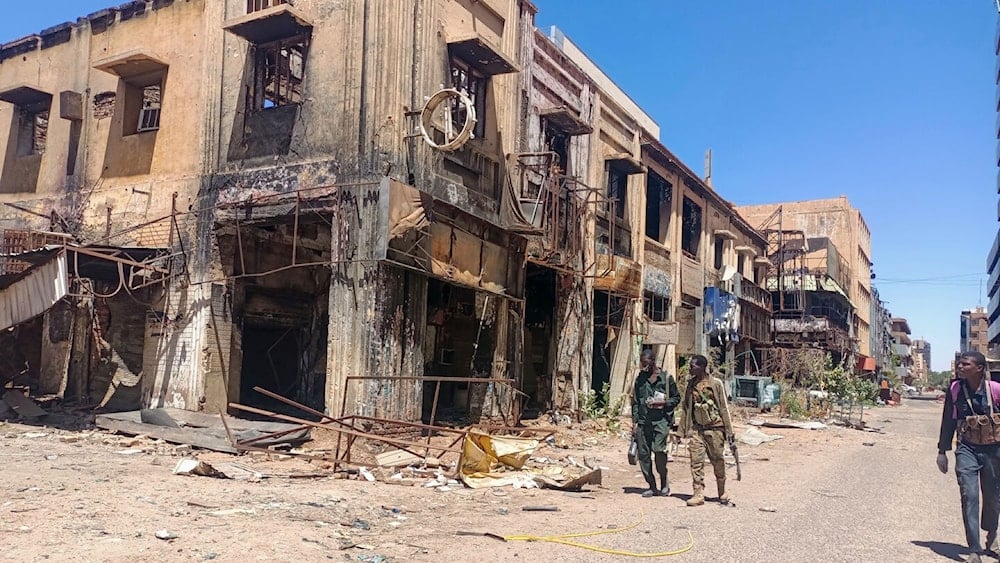Sudan: Satellite images reveal atrocities after El Fasher siege
Paramilitary RSF forces have overrun El Fasher in Sudan after an 18-month siege, with satellite images and videos exposing atrocities amid the deepening Sudan crisis.
-

Fighters loyal to Sudan's Army patrol a market area in Khartoum on March 24, 2025. (AFP via Getty Images)
Paramilitary forces from the Rapid Support Forces (RSF) have taken control of the city of El Fasher in Sudan, marking a grim new chapter in the Sudan civil war. The seizure of the city followed an 18-month siege, during which access to food, medicine, and humanitarian aid was severely restricted.
According to eyewitness reports and satellite imagery cited by The Financial Times, the RSF’s takeover has resulted in mass killings, including the reported massacre of 460 patients and their families at El Fasher’s Saudi Maternity Hospital.
The World Health Organization described the violence as reminiscent of the “darkest days” of the Darfur rebellion more than two decades ago.
Read more: Sudan urges UNSC to investigate 'genocide' in Darfur's El Fasher
Satellite evidence points to war crimes
Satellite images reviewed by the Yale Humanitarian Research Lab this week revealed clusters of what appear to be human remains within the grounds of the Saudi hospital, alongside ominous red discolorations consistent with blood, according to FT.
🚨HUMAN SECURITY EMERGENCY🚨
— Humanitarian Research Lab (HRL) at YSPH (@HRL_YaleSPH) October 29, 2025
Day 2: RSF continues mass killings in El Fasher: @HRL_YaleSPH finds evidence of mass killings at RSF-controlled former Children’s Hospital, Saudi Hospital and along the berm.#KeepEyesOnSudan
🛰️@AirbusSpace @Maxarhttps://t.co/1HApllgNL5 pic.twitter.com/g9KmBLhjH0
Separate videos posted online by RSF fighters and commanders show what appear to be war crimes committed on the city’s streets and within medical facilities.
One video features RSF commander Al-Fatih Abdallah Idris, known as Abu Lulu, executing captured civilians. Human rights groups have previously linked him to atrocities in Darfur.
The RSF has posted several videos from El Fasher showing scenes of violence, executions, and civilians fleeing the area, providing what analysts say may be direct evidence of crimes under international law.
Read more: UN urges urgent action as Sudan crisis deepens
Massacres in hospitals and streets of Darfur
The Sudan Doctors Network accused the RSF of transforming hospitals into “human slaughterhouses.” One spokesperson told the Financial Times, “They coldbloodedly killed everyone they found inside the Saudi hospital, including patients, their companions, and anyone else present in the wards.”
The RSF captured El Fasher’s airport and military base on Sunday, removing the Sudanese Armed Forces (SAF) from their final stronghold in Darfur.
The city had served as a refuge for many of the region’s Black African residents, who had long been targeted by RSF militias.
El Fasher’s role in the broader Sudan civil war
The fall of El Fasher marks a major shift in the Sudan civil war, which began in 2023 between the RSF and its former allies in the Sudanese Armed Forces. According to the United Nations, the conflict has caused the world’s worst humanitarian crisis, with more than 14 million people displaced and at least 150,000 killed.
The RSF, which evolved from the Janjaweed militias implicated in previous Darfur atrocities, has long faced accusations of genocide and systematic violence against civilians.
More than 30,000 people have fled El Fasher since Sunday, according to the International Organization for Migration. However, an official with UNICEF warned that at least 130,000 children remain in the city and are “at grave risk, trapped by shelling and fighting, with reports of abductions, killings, maiming and sexual violence.”
Read more: UN warns of worsening siege, cholera outbreak in Sudan's Darfur
Global calls for accountability and access
In a televised speech, RSF leader Mohamed Hamdan Dagalo, known as Hemedti, acknowledged “transgressions” in El Fasher and said investigation committees had been dispatched to the city.
He called for the immediate release of any civilians “unlawfully detained” and claimed the RSF was working to verify videos circulating online.
However, with mounting civilian casualties and damning visual evidence, the international community is intensifying pressure for access to affected areas and independent investigations into what may be among the most severe atrocities committed during the Sudan crisis.

 4 Min Read
4 Min Read










